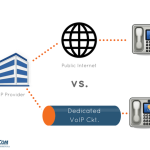“Cloud computing” has become a relatively new buzzword that describes decades-old approach to sharing computing resources.
In a nutshell, cloud computing refers to making software, number crunching and storage technology available through a network of servers that are located somewhere else. Broadly speaking, cloud computing allows users to employ somebody else’s servers for storing, retrieving and changing data.
Why are private clouds better for large organizations?
With private clouds, you have control over the hardware and software alike. You also can act quickly and effectively when things break, and you can ensure that nobody leaves a virtual door open for cyber villains to enter your cloud and make mischief.
The trouble is, building a cloud system of your own can be a costly and cumbersome process. Setting up a cloud can take months, and the existing vendors you’d need to tap for technology and related services may be expensive.
What to do? Answers are starting to emerge in the form of what Gartner is calling cloud management platforms, services that marry computing power with networking and storage in a way that is both more affordable and can be constructed literally overnight.
One more benefit: Big Cost Savings
Along with that flexibility comes substantial cost savings. By essentially renting time on pricey servers, your business avoids most of the dreaded “costs of ownership” of those machines, such as maintenance and upgrades – not to mention replacement expenses every few years.
(As we will see in future blogs, those costs savings depend on several factors, and the costs of the various types of cloud solutions might not be what they appear at first.)
Capital expenses can be freed up to grow the business instead. A recent study of 1,300 organizations in the UK and the United States, 62 percent of respondents said cloud computing enabled them to invest more money back into their businesses. Companies said infrastructure costs were reduced 23 percent. And, on average, the cloud improved profits by 22 percent, the survey found.
The IT department is bound to love the use of cloud in their arena, since it saves them from maintaining, upgrading, fixing and replacing software and hardware systems. Responsibility for those chores rests with the cloud provider, allowing chief information officers to focus on more important matters.
Some executives also report other unexpected perks from shifting to the cloud. Companies have found benefits ranging from smoother sailing into new lines of business to easier mergers and acquisitions.
[php snippet=8]






